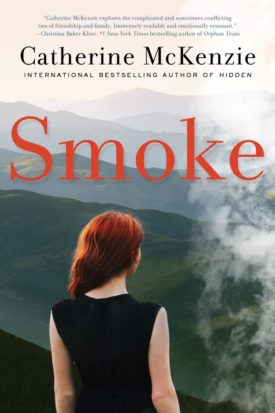 Synopsis:
Synopsis:
Smoke is an evocative tale of two women navigating the secrets and lies at the heart of a wildfire threatening their town.
After a decade-long career combating wildfires, Elizabeth has traded in her former life for a quieter one with her husband. Now she works as the local arson investigator in a beautiful, quaint town in the Rockies.
But that tranquil life vanishes when she and her husband agree to divorce and a fire in nearby Cooper Basin begins to spread rapidly. For Elizabeth, containing a raging wildfire is easier than accepting that her marriage has failed.
For Elizabeth’s ex-friend Mindy, who feels disconnected from her husband and teenage children, the fire represents a chance to find a new purpose: helping a man who has lost his home to the blaze. But her faith is shattered by a shocking accusation.
As the encroaching inferno threatens the town’s residents, Elizabeth and Mindy must discover what will be lost in the fire . . . and what will be saved.
Review:

Smoke may perhaps be McKenzie’s best work to date. That’s high praise, considering that all of her books have been extremely enjoyable.
But with Smoke she achieves new levels of emotional depth as her characters are challenged by relationships, life choices, and, perhaps most importantly, literal and metaphorical smoke. They are strong women with careers and opinions who find themselves confronting issues they did not anticipate. Thus, they feel ill-equipped to do so. And that is not the only way in which her believable and sympathetic characters are flawed, but that universal sense of confusion, layered with betrayals, secrets, and plenty of suspense, permit readers to take them into their hearts.
The story’s pace never slows as the complications mount and the characters face not just emotional, but actual physical danger that demands intelligent decision-making and immediate action.
The book may resonate deeply with readers in the western United States because it was published in the midst of California’s worst-ever fire season to date, thanks to four solid years of drought. In my case, I read the book as thousands of acres burned a mere forty to fifty miles from my beautiful, peaceful home. I pondered skies cloudy with ash being carried into my neighborhood by dangerous winds exacerbating the crisis, checking news reports about the real fires ravaging my home state during breaks from reading about the fires threatening to claim the relationships and home of McKenzie’s empathetic female protagonist. Because the backdrop against which the characters’ experiences play out heightens the story’s credibility and makes their struggles particularly empathetic.
McKenzie provides her usual satisfying ending. When the smoke clears — literally and metaphorically — readers are left feeling that the tense moments shared with fictional friends they have come to care deeply about were well worth it. Smoke is deservedly McKenzie’s most acclaimed and successful work to date.


















Comments are closed.